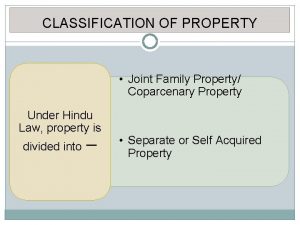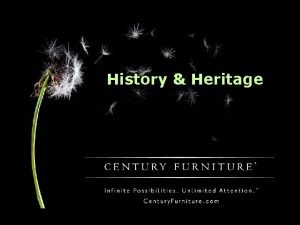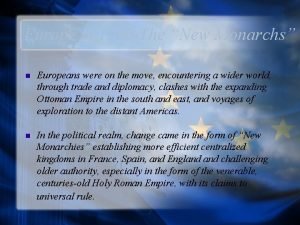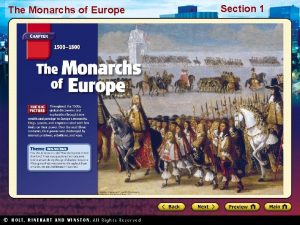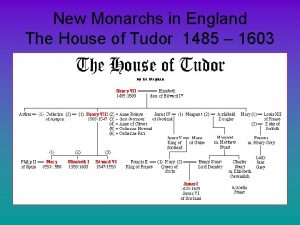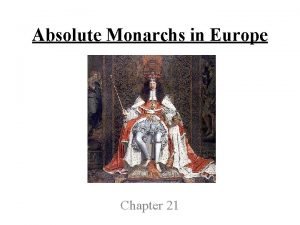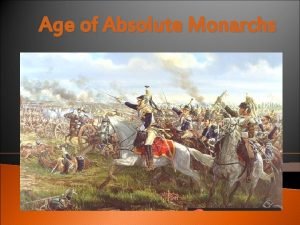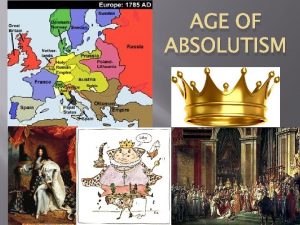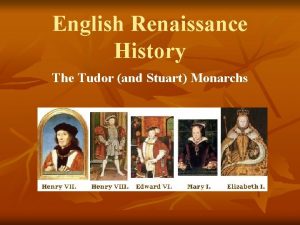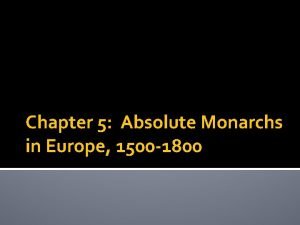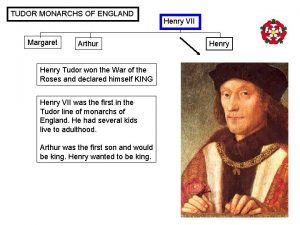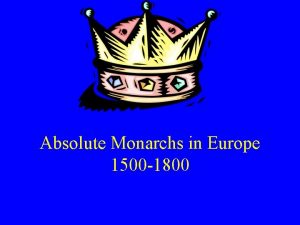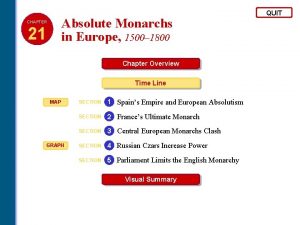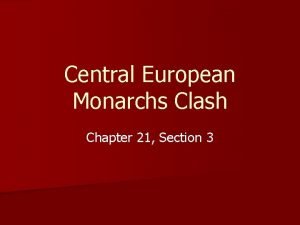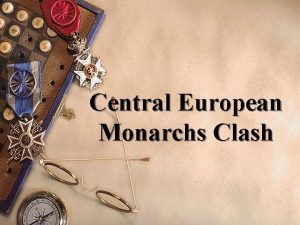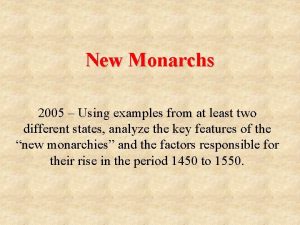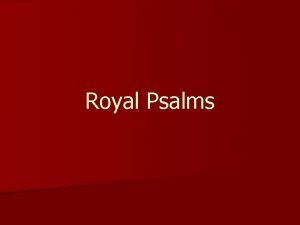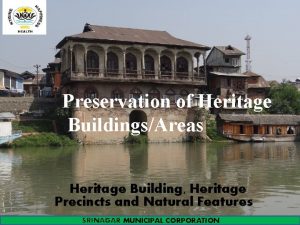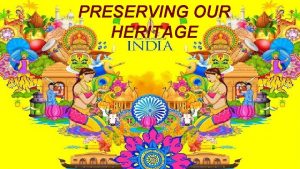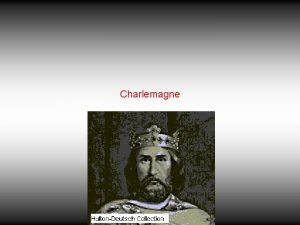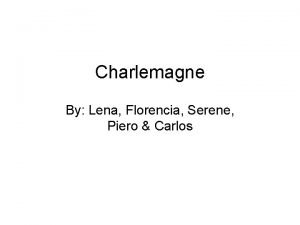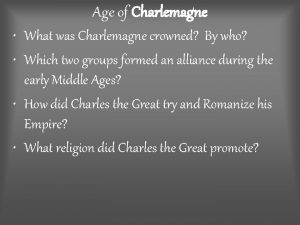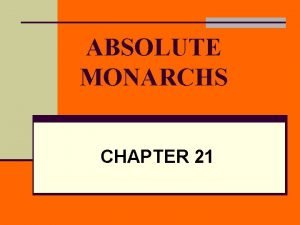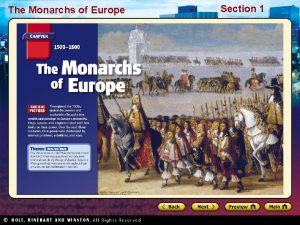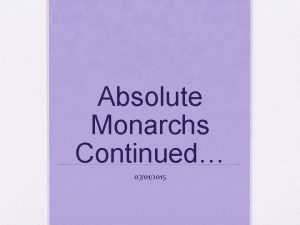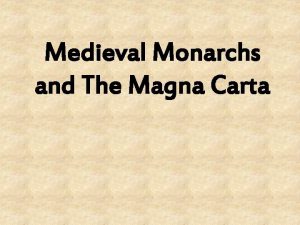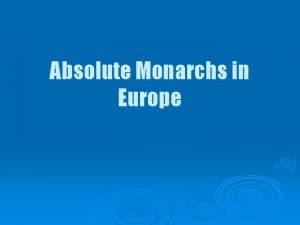CHARLEMAGNE A MONARCHS STORY ROYAL HERITAGE Charlemagne was


















- Slides: 18

CHARLEMAGNE A MONARCH’S STORY

ROYAL HERITAGE • Charlemagne was one of Europe's most successful monarchs. He was king of the Franks in 768 CE. His father, Pepin the Short, ruled before him, and his grandfather - Charles Martel - ruled before that. These two men were good rulers, but Charlemagne was a far more impressive king. Charlemagne Pepin the Short Charles Martel

MAGNANIMOUS • For one thing, he was very tall. He was over 6 feet tall, perhaps even as tall as 6'4". He had blonde hair that seemed to glow in the sun. He was always laughing. His dogs were his constant companions, forever racing around his feet, wherever he went. He never walked. He always strode. If you wanted to talk to Charlemagne, you had to keep up. He knew everyone in his castle by name, from his top advisors to the lowliest peasant.

ACCOMPLISHMENTS • Trial by jury vs. trial by ordeal. • Trial by ordeal: • If a peasant was accused of a crime, they had to hold a red-hot poker to their hand until in was badly burned. If it healed in three days, they were found innocent. If it didn’t heal, they were guilty. • If you were a noble, you had to fight someone to free yourself. If you lived, they let you go. If you died… you were dead, so it didn’t matter!

I’m innocent, I swear!!

TRAIL BY PANEL • Under Charlemagne's system, each accused person would be heard by a panel of honorable men, men who had taken an oath to listen and to judge fairly based on the evidence presented. There was still corruption, but this system had a much better chance of being fair than did the old one. • Our modern jury system, trial by jury, slowly developed from this early start.

EDUCATION • One of the most important things Charlemagne did for the world was to turn his castle into a learning center - inviting scholars from all over the world to take up residence there. He used his scholars to create illuminated manu -scripts that preserved knowledge during the Dark Ages.

EXPANSION • The Franks were legendary fighters. Using the strength and loyalty of his army, combined with his own leadership abilities, Charlemagne soon defeated most of the other barbarian tribes in Western Europe. He expanded the Frankish Empire to include Germany, all of France, most of Italy, and even sections of northern Spain. • When the Frankish Empire went to war, Charlemagne was in the thick of things. He was easy to spot. Besides being so tall, he often wore a blue cape over his fur coat, which made him appear even larger. He had to have been a most visible target. Yet, somehow, he managed to survive battle after battle. He died of old age in his seventies, which for the times was a really old age.


GOVERNMENT • Charlemagne ruled his vast empire by using local officials called counts to help him. Each count was responsible for solving local problems. They also had the job of finding men and raising armies for the kingdom. At least once a year, Charlemagne paid surprise visits to his various counts to make sure they were managing fairly and effectively. • DISCUSSION: Why would delegating like this be a good idea?

STANDARDIZED MONEY • Local administrators collected taxes from the people. The amount due was fixed. People knew how much they owed. Most taxes were paid in barter. The tax collector could decide the value of a pig or of a bale of hay. Charlemagne realized this system could easily lead to an abuse of power. He changed that system too. He introduced a payment system using silver coins. He standardized the value of each coin. It was no longer up to the tax collector to assign a pig a value. The farmer could sell his pig and then pay his taxes.

SILVER COIN

CHARISMATIC LEADER • Charlemagne held his kingdom together by the sheer force of his personality. He was not a king in a palace somewhere. He was out and about. He heroically fought in battles, wearing his big blue cape. He personally visited local administrators, creating new laws to protect his people. He had a horrible singing voice, but he often burst into song, as he strode through village after village.

THE CHURCH GETS INVOLVED • One of the biggest things that Charlemagne did was unite church and state. This means that the Catholic church and the government were tied to each other. Basically it put the church in charge of handling taxes and things like that. • It may not have been a perfect system, but it was organized and brought a lot of people together.

CAROLINGIAN RENAISSANCE • All these good changes brought about enlightenment, or all-around better understanding and civilization. • Charlemagne put together a writing system that was common and easier to write.

Spaces between words Clear, capital letters

LATIN • Can you decipher it? • MONASTERIESWERECHURCHESFARMSHOMESAND SCHOOLSALLROLLEDINTOONEMOSTMONKSSPENT MUCHOFTHEDAYINPRAYERTHEYALSOFARMEDSTU DIEDANDMADEWINEMEDICINESANDCRAFTGOODS MONASTERIESSERVEDASCENTERSOFLEARNINGIN THEMIDDLEAGES…

CAROLINGIAN MINISCULE • Monasteries were churches, farms, homes, and schools all rolled into one. Most monks spent much of the day in prayer. They also farmed, studied, and made wine, medicines, and craft goods. • Monasteries served as centers of learning… • Better? ?
 Sapratibandha daya and apratibandha daya
Sapratibandha daya and apratibandha daya World heritage is our heritage slogan
World heritage is our heritage slogan Sapratibandha
Sapratibandha The invisible man battle royal
The invisible man battle royal New monarchs examples
New monarchs examples Chapter 5 absolute monarchs in europe
Chapter 5 absolute monarchs in europe The new monarchs
The new monarchs Spain's empire and european absolutism chapter 21 section 1
Spain's empire and european absolutism chapter 21 section 1 Age of absolute monarchs
Age of absolute monarchs Age of absolute monarchs worksheet answer key
Age of absolute monarchs worksheet answer key English renaissance time period
English renaissance time period 5 monarchs of europe
5 monarchs of europe Monarchs of england
Monarchs of england Absolute monarchs in europe 1500-1800
Absolute monarchs in europe 1500-1800 Chapter 5 absolute monarchs in europe answer key
Chapter 5 absolute monarchs in europe answer key Central european monarchs clash
Central european monarchs clash Central european monarchs clash
Central european monarchs clash New monarchs examples
New monarchs examples Age of absolute monarchs
Age of absolute monarchs
